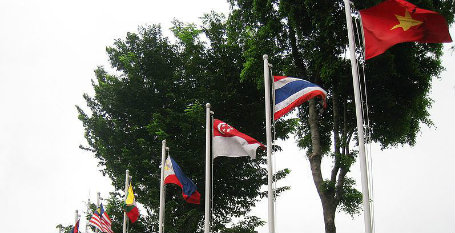A Thailand-based NGO working for gay, transgender and other migrant workers affected by HIV is urging the ASEAN Health Ministers presently meeting in Vietnam to commit to a compassionate public health response to migrant workers affected by HIV, tuberculosis and malaria.
“Undocumented migrants including gay men and transgender people with HIV and tuberculosis that come to our attention usually die without ever getting access to medical services,” said Nikorn Chimkong, Executive Director for The HIV Foundation Thailand that connects vulnerable migrant people affected by HIV to services that can save their lives.
Avoidable deaths from communicable diseases among the vulnerable sections of migrant workers in ASEAN member states remain unreasonably high because migrant mortality rates are inadequately documented and so are largely ignored, Chimkong explained. Problems in health service access and delivery among migrants are not being studied or addressed adequately, he added.
That is why the foundation calls for a “compassionate response” to undocumented migrants in ASEAN member states, Chimkong said adding that ASEAN states need a plan, beyond simply detaining and deporting these individuals, so that their deaths are prevented.
Even in ASEAN countries where health insurance should be available for them, migrants continue to die with HIV and tuberculosis, he pointed out.
The 12th ASEAN Health Ministers Meeting is currently underway in Vietnam Sept. 15 to 19. ASEAN or the Association of Southeast Asian Nation comprises Brunei, Cambodia, Indonesia, Laos, Malaysia, Myanmar, Philippines, Singapore, Thailand and Vietnam.
“We urge individual Health Ministers in the ASEAN region to avoid using inflammatory language to describe migrants and mobile populations within their jurisdictions (and) urge the meeting to prioritize the scale-up of specialist migrant health services in the region,” the foundation said in its press release.
Thailand for example has an estimated 2 or 3 million mostly undocumented and young migrant workers from the relatively poorer neighboring countries of Cambodia, Laos and Myanmar who work in agriculture and fisheries, construction, manufacturing and as domestic workers. Malaysia and Singapore also have a sizeable number of such migrant workers.
The ASEAN region comprises both rich and poor economies and has large sections of mobile migrant workers moving borders for better economic prospects.
Moreover, the region has a diverse range of attitudes toward the LGBT community with some countries such as Brunei legislating death by stoning for those having same-sex relations, Malaysia and Singapore where it is illegal and punishable by jail and public caning and Thailand where it is not legally proscribed but by where social stigma remains a concern.
“Undocumented migrants including gay men and transgender people with HIV and tuberculosis that come to our attention usually die without ever getting access to medical services,” said Nikorn Chimkong, Executive Director for The HIV Foundation Thailand that connects vulnerable migrant people affected by HIV to services that can save their lives.
Avoidable deaths from communicable diseases among the vulnerable sections of migrant workers in ASEAN member states remain unreasonably high because migrant mortality rates are inadequately documented and so are largely ignored, Chimkong explained. Problems in health service access and delivery among migrants are not being studied or addressed adequately, he added.
That is why the foundation calls for a “compassionate response” to undocumented migrants in ASEAN member states, Chimkong said adding that ASEAN states need a plan, beyond simply detaining and deporting these individuals, so that their deaths are prevented.
Even in ASEAN countries where health insurance should be available for them, migrants continue to die with HIV and tuberculosis, he pointed out.
The 12th ASEAN Health Ministers Meeting is currently underway in Vietnam Sept. 15 to 19. ASEAN or the Association of Southeast Asian Nation comprises Brunei, Cambodia, Indonesia, Laos, Malaysia, Myanmar, Philippines, Singapore, Thailand and Vietnam.
“We urge individual Health Ministers in the ASEAN region to avoid using inflammatory language to describe migrants and mobile populations within their jurisdictions (and) urge the meeting to prioritize the scale-up of specialist migrant health services in the region,” the foundation said in its press release.
Thailand for example has an estimated 2 or 3 million mostly undocumented and young migrant workers from the relatively poorer neighboring countries of Cambodia, Laos and Myanmar who work in agriculture and fisheries, construction, manufacturing and as domestic workers. Malaysia and Singapore also have a sizeable number of such migrant workers.
The ASEAN region comprises both rich and poor economies and has large sections of mobile migrant workers moving borders for better economic prospects.
Moreover, the region has a diverse range of attitudes toward the LGBT community with some countries such as Brunei legislating death by stoning for those having same-sex relations, Malaysia and Singapore where it is illegal and punishable by jail and public caning and Thailand where it is not legally proscribed but by where social stigma remains a concern.












 打印版本
打印版本



















读者回应
请先登入再使用此功能。